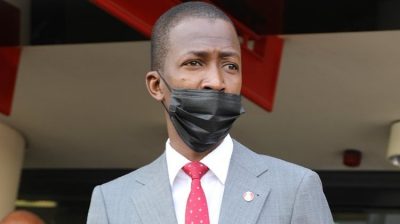
Abdulrasheed Bawa, the executive chairman of the Economic and Financial Crimes Commission, EFCC has insisted that chief executives of commercial banks must declare that assets, despite subtle resistance from those concerned. The EFCC boss said the directive was not meant to witch-hunt anyone, but necessary to prevent another banking meltdown in the country.
Bawa disclosed this, on Monday, at the opening session of a capacity-building workshop organized by the Nigeria Deposit Insurance Corporation, NDIC for the law enforcement agencies in Abeokuta, Ogun State.
The anti-graft agency boss had on assumption of office in May this year, issued a statement directing bank CEOs to declare their assets, saying that it was necessary for them to do so, in other to promote financial transparency, adding that its directive was in conformity with Section 1 of the Bank Employees, ETC. (Declaration of Assets) Act 1986.
Bawa said then in the statement said, ”We are doing our best to ensure that this country is free of financial crimes. We understood that the tail end of every financial crime is for the criminal to have access to the funds that he or she has illegitimately gotten, and we’re worried about the roles of financial institutions.
”We hope that all financial institutions, particularly the bankers, will declare their assets as provided for by the law, in accordance with the Bank Employees Declaration of Asset Act. And that the EFCC, come June 1, 2021, will be demanding for this asset declaration forms, filled by the bankers so that the line that we have drawn from the first of June is really complied with by bankers in particular.”
“Section 1 of the Bank Employees, ETC. (Declaration of Assets) Act 1986 makes it mandatory for every employee of a bank to make full disclosure of assets upon employment, and annually in subsequent years.
‘’The law under Section 7 (1) stipulates that it shall be an offence for an employee of a bank to own assets in excess of his legitimate known and provable income. The penalty for violation of the Act as spelt out in section 7 (2) includes imprisonment for a term of ten years.
‘’Any employee guilty of an offence under subsection (1) of this section shall on conviction be liable to imprisonment for ten years and shall, in addition, forfeit the excess or its equivalent in money to the Federal Government,’’ Bawa said.
Speaking again on the issue yesterday, the EFCC boss said it will press ahead to implement the directive despite resistance by those concerned. He, however, stated that the Commission was not particularly after any CEO, adding that the measure became important in other to rid the financial sector of corruption.
According to him, “I recall that upon assumption of office, one of the major pronouncements I made was giving a directive to bankers to declare their assets before June 1, 2021.
“It is obvious that those who kicked or are still kicking against the directive are ignorant of the unmistakable details of the Bank Employees Declaration of Assets Act.
“The nation cannot afford to go through another serious crisis in the banking sector, and this explains the constant intervention by the EFCC.”
In 2010, many commercial bank CEOs were sacked and later charged to court by then Central Bank Governor, Lamido Sanusi over mismanagement of customers deposits.

